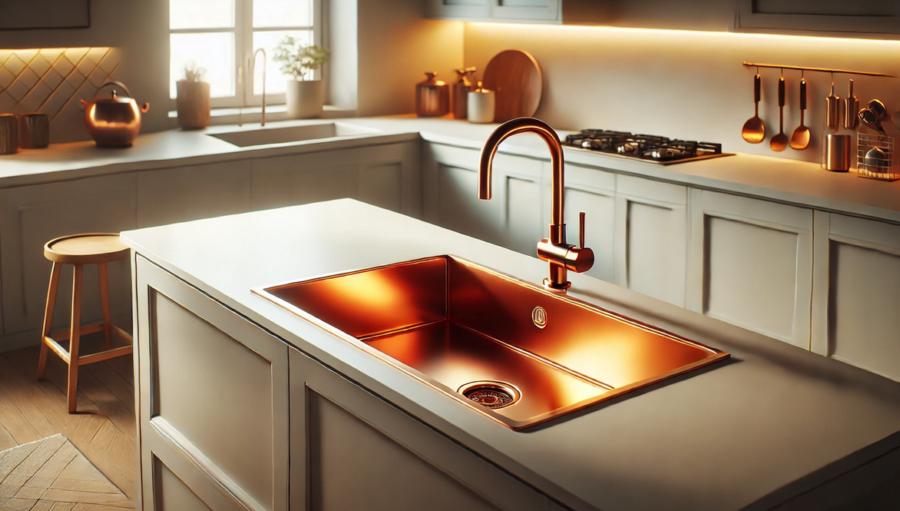A Sink That Cleans Itself? Sort of.
Most things in your kitchen require constant cleaning—dishes, countertops, that one rogue spoon that always seems to end up on the floor. But what if your sink actually helped you out instead of just being the thing you wash everything in? That’s exactly what a copper sink does.Copper is like the overachiever of the periodic table, naturally eliminating bacteria without being asked. Unlike stainless steel or porcelain sinks, which demand soap, scrubbing, and a small emotional breakdown when you see a stubborn stain, copper actively works against microbes. It’s not magic; it’s science. And frankly, it makes you wonder why more things in your home don’t have this superpower.
The Science Behind Copper’s Germ-Killing Superpowers
Let’s talk about oligodynamic effect. No, that’s not a fancy term for your ability to stay awake during a boring meeting. It’s the process by which certain metals, including copper, kill bacteria by messing with their cellular structure.Here’s how it works: when bacteria land on a copper surface, they’re in for a bad time. The metal releases ions that puncture their cell membranes, interfering with their respiration and ultimately leading to their untimely demise. Essentially, bacteria meet their microscopic doom just by touching copper. No chemicals. No scrubbing. Just a slow-motion microscopic battle happening right on your sink.
This isn’t just a wild claim, either. The U.S. Environmental Protection Agency (EPA) has actually certified copper as an antimicrobial material. This means it’s proven to kill 99.9% of harmful bacteria like E. coli and Salmonella within just a few hours. Meanwhile, your stainless steel sink is sitting there, letting bacteria have a house party.
Fewer Harsh Cleaners, More Peace of Mind
Most people are on a never-ending quest to keep their kitchen sink from becoming a petri dish. This usually involves aggressive cleaning sprays, mysterious foaming agents, and the vague hope that whatever you’re using isn’t poisoning your entire household.With a copper sink, you can dial down the chemical warfare. Since copper is naturally antimicrobial, you don’t need to douse it in bleach every five minutes to keep it hygienic. A simple rinse and occasional mild soap are usually enough. No need to play detective with the ingredient list on your cleaning products or question if your sink is secretly conspiring against your immune system.
Patina: Nature’s Built-In Cleaning System
Unlike stainless steel, which shows every single fingerprint and water spot like it’s keeping a record of your crimes, copper develops something called a patina over time. This natural aging process not only gives it a unique and ever-changing appearance, but it also enhances its antimicrobial properties.The patina is essentially a protective layer that continues the bacteria-killing process while making your sink look like it belongs in an upscale chef’s kitchen. And if you don’t like the darker tones it develops over time? A little lemon and salt can bring back the shine.
Stainless steel, on the other hand, just gets dull, scratched, and leaves you wondering why it never looks as good as it did in the showroom.
Goodbye, Funky Sink Smells
If you’ve ever walked into your kitchen and thought, “What is that smell?” only to realize it’s coming from your sink, you’re not alone. Stainless steel and porcelain sinks can trap bacteria and food particles in tiny scratches and crevices, leading to that delightful mystery odor.Copper, however, is like the bouncer at an exclusive club—bacteria simply aren’t welcome. Because it continuously eliminates microbes, it reduces the build-up of odor-causing bacteria before they have a chance to settle in and make themselves at home. So instead of playing detective with a bottle of vinegar and baking soda, your copper sink is already handling the situation for you.
Less Work, More Style
Let’s be honest: most kitchen sinks are purely functional. They sit there, they hold water, and they rarely get a second glance unless they’re clogged. But a copper sink? That’s a statement piece. It doesn’t just sit in your kitchen—it owns the space.Not only is it aesthetically striking, but it also evolves over time. Unlike standard sinks that show their age in all the wrong ways (stains, scratches, a growing resentment towards you), copper gets better with age. The rich, ever-changing patina gives it character, and since it’s constantly working to stay clean, it looks fresher with less effort.
Wouldn’t it be nice if everything in life worked that way?
A Smarter Choice for a Healthier Kitchen
With all the focus on food safety, we sanitize our cutting boards, obsess over expiration dates, and wash our hands like surgeons. But how often do we think about the very place where we rinse and clean everything?A copper sink adds an extra layer of protection without extra effort. Instead of relying solely on disinfectants that might leave behind chemical residues, you have a natural ally that’s working 24/7. It’s like having a silent kitchen assistant who never complains, never takes a break, and definitely never forgets to do its job.
Sink Into the Future
It’s not often that upgrading your kitchen sink feels like a power move, but a copper sink is exactly that. It’s elegant, efficient, and actively fights bacteria while you focus on more important things—like finally perfecting that complicated recipe you saw on a cooking show.So while everyone else is busy scrubbing their sinks like their life depends on it, yours is quietly handling business. A sink that cleans itself (well, almost)? That’s the kind of kitchen upgrade that makes you wonder why you didn’t do it sooner.
Article kindly provided by metalsheets.co.uk


